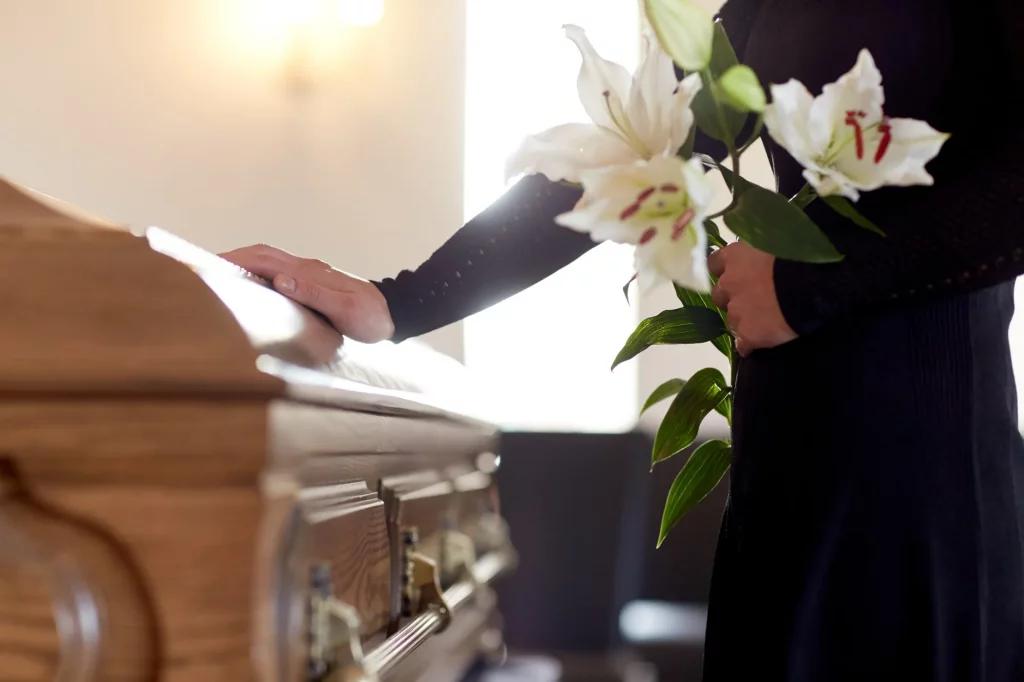
WHY?
1.You make it easier on your loved ones

Funeral planning involves many details that can be overwhelming for grieving family members to handle. Some of the tasks that need to be taken care of immediately following a death include making funeral arrangements, coordinating with the funeral home and cemetery, obtaining death certificates, notifying family and friends, and arranging for transportation. When you pre-plan your funeral, you can take care of many of these tasks in advance, so your loved ones won’t have to worry about them. You can also choose to prepay for your funeral expenses, which can help relieve your family of any financial burden and ensure that your funeral is paid for in full.
Pre-planning your funeral can also help prevent any confusion or disagreements among family members regarding your wishes. By having a clear plan in place, your family won’t have to guess what you would have wanted or make difficult decisions during an already emotional time. This can help reduce stress and tension, allowing your loved ones to focus on grieving and honoring your memory.
- You can ensure your wishes are met
- You can ensure your wishes are met

Everyone has different preferences when it comes to how they’d like to be remembered after they pass away. Some people may prefer a formal and traditional funeral service, while others may want a more casual celebration of their life. When you pre-plan your funeral, you can make sure that your service reflects your unique personality and values.
You can choose the type of service you’d like to have, whether it’s a traditional funeral or a more personalized celebration of life. You can also select the music, readings, and any other special elements you’d like to include. This can help ensure that your funeral.
In addition, pre-planning your funeral can also help ensure that your final wishes are carried out. For example, if you have specific burial or cremation preferences, you can include them in your funeral plan. You can also indicate if you’d like to donate your organs or tissues, and if you have any specific instructions for your obituary or memorial service. This can provide peace of mind knowing that your wishes will be met after you pass away.
3. You'll save money

One of the significant benefits of funeral planning is the cost savings it provides. By planning ahead, you can take the time to research and compare prices from different funeral homes to select the most affordable option that fits your budget. Funeral homes often offer discounts for pre-planning services, which can further reduce your expenses.
Moreover, purchasing caskets, urns, and headstones through the funeral home can significantly increase the costs. However, when you plan ahead, you have the opportunity to buy these items from outside vendors, which often cost about half the price. This means that you can save a considerable amount of money by planning ahead and shopping around.
Funeral planning not only helps you save money but also reduces the financial burden on your loved ones. By taking care of your funeral arrangements in advance, you can ensure that your family doesn’t have to bear the financial burden and stress of arranging your funeral during an already challenging time. This allows your loved ones to focus on grieving and healing, rather than worrying about funeral expenses.
In conclusion, funeral planning is an essential aspect of life planning that offers numerous benefits, including cost savings. By taking the time to plan ahead, you can choose the most affordable funeral service that fits your budget and reduce the financial burden on your loved ones.
How?

Step 1: Choose a funeral home and director
Selecting the right funeral home and director is an essential part of funeral planning. It is important to choose a funeral home and director that will be sensitive to your needs, values, and cultural beliefs. You can research local funeral homes online, read reviews, and ask for recommendations from friends and family members who have recently had to plan a funeral. Once you have selected a funeral home, schedule a meeting with the director to discuss your options and preferences.
During the meeting, the director will provide you with general guidance and support. They will help you with the collection and care of the person who has died, planning and overseeing proceedings, and organising and coordinating other parties involved in the funeral. The director will also provide you with a price list for their services, which can help you to determine your budget.
Step 2: Decide on the type of funeral and coffin
There are many options available when it comes to planning a funeral. You can choose a traditional burial, cremation, green burial, interment in a mausoleum, or another type of service. Each option has its advantages and disadvantages, and it is essential to consider your personal beliefs, values, and financial situation before making a decision.
Once you have decided on the type of funeral, you can select a coffin or casket that fits your preferences and budget. Coffins can be made from various materials, such as solid wood, chipboard, cardboard, or other biodegradable materials. You can also personalise the coffin with images or messages.
Step 3: Arrange the funeral service
The funeral service is an opportunity to celebrate the life of the person who has died and to provide comfort and closure to those who are grieving. You can customise the service to reflect the person’s personality, beliefs, and values. Some of the things you can arrange include:
- What mourners need to wear. For example, it’s common for people to wear brighter colours at more modern funerals.
- The music to be played during the service and as mourners exit.
- A personal eulogy or tribute to the person who has died.
- Funeral flowers and arrangements, which can be chosen to reflect the person’s favourite colours or flowers.
- Poems or readings to be read during the service.
Step 4: Locate all pre-arrangements
If the person who has died had made any pre-arrangements, it is important to locate them and follow them. Pre-arrangements can include decisions about burial or cremation, the type of funeral service, and any other special requests the person may have had. It is essential to include any pre-arrangements in the will or to tell a trusted family member or friend about them.
If the person had paid for funeral plots, bought funeral insurance, or chosen a memorial service, these should also be included in the will. This can help to ensure that the person’s wishes are carried out and that their legacy is honoured.
References
https://www.freewill.com/learn/6-reasons-to-pre-plan-your-funeral
https://decorative-urns.com/cremation-blog/estate-planning/top-10-reasons-to-pre-plan-your-funeral/
https://www.geiselfuneralhome.com/benefits-of-funeral-pre-planning
https://www.sunlife.co.uk/funeral-plans/funeral-planning-guide/
A Pillar of Strength in Golden Years: 10 Paths on How Regular Screenings Uphold Your Health
In the evocative voyage of life, the golden years emerge as a time to relish the fruits of decades of labor, to bask in the
Unlock the Secret to Sweet Dreams: 10 Ways of Enhancing Sleep Quality as You Age
Share on facebook Facebook Share on twitter Twitter Share on linkedin LinkedIn Share on pinterest Pinterest Share on telegram Telegram Share on whatsapp WhatsApp Share
Building Bridges, Not Walls: 10 Methods of Mastering the Art of Cultivating Social Connections in the Golden Years
Share on facebook Facebook Share on twitter Twitter Share on linkedin LinkedIn Share on telegram Telegram Share on whatsapp WhatsApp Share on email Email Share
Navigating the Golden Years: 10 Ways to Achieve Emotional Wellness and Conquering Loneliness
Share on facebook Facebook Share on twitter Twitter Share on linkedin LinkedIn Share on pinterest Pinterest Share on telegram Telegram Share on whatsapp WhatsApp Share
Stay Brainy in Your Golden Years: 10 Fun Activities to Keep Your Mind Sharp and Engaged!
Hello, brain buffs! Aging might be inevitable, but letting our minds turn to mush? No way, José! Time to boot up those brain cells and
10 Effective Exercise Routines for Older Adults: Low-Impact Fitness Options
Of course, maintaining physical health is crucial at any age, but especially so as we grow older. Here are ten gentle, effective, and friendly exercise